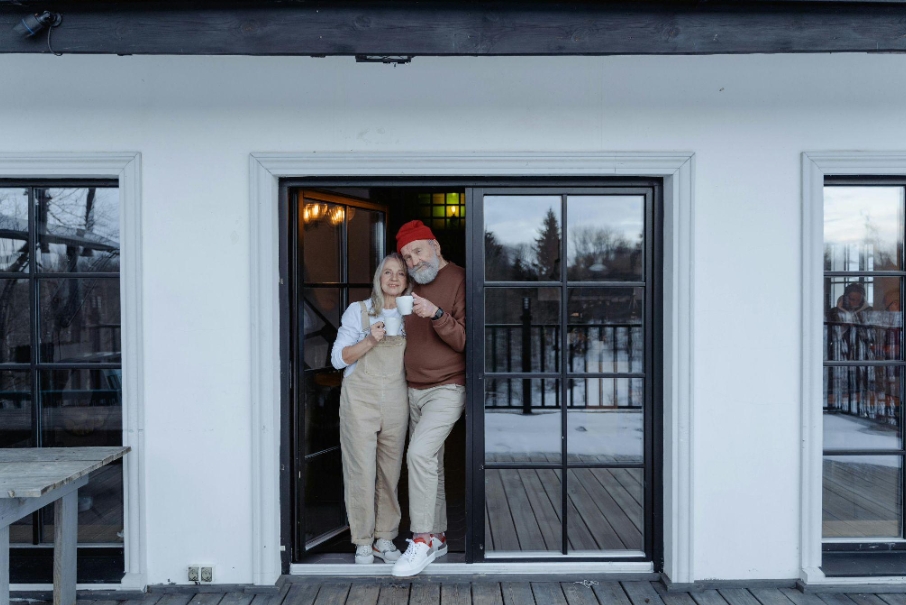If you’ve ever stepped outside on a cold Canadian morning, you know winter can be tough. Between icy sidewalks, shorter days, and freezing winds, this time of year can be especially hard for older adults. Seniors are more likely to feel the effects of cold weather and face real risks, like falls, illness, or even isolation.
Canada is known for its long winters. Whether you’re in the middle of a snowy storm in Ontario or facing the biting winds in Alberta, staying safe takes a little more planning during this season. The good news? A few simple steps can make winter safer and more comfortable for seniors at home and on the go.
Let’s look at how you can protect yourself or your loved ones with practical, no-nonsense winter safety tips.
Staying Safe When Going Outdoors
Getting some fresh air is good for everyone, but winter makes it more complicated. One slip on the ice can lead to serious injuries, and freezing temperatures can become dangerous if you’re outside for too long. That’s why it’s so important to be prepared before heading out.
Start with good footwear. Shoes or boots with non-slip soles help reduce the risk of slipping. Add removable ice grips for extra safety. Make sure the person going out is dressed in warm layers — a base layer, sweater, winter coat, hat, scarf, and gloves all matter.
It’s also smart to plan routes ahead of time. Stick to well-shoveled sidewalks and avoid going out in extreme cold unless it’s absolutely necessary.
For added peace of mind, consider using a GPS tracker for seniors anywhere in Canada. These devices are helpful if a loved one gets turned around or can’t communicate where they are. Whether they enjoy winter walks or live in a remote area, GPS trackers help family members or caregivers find them quickly during an emergency.
Preventing Illness with Smart Habits
Colds and flu spread more easily in winter, and seniors are more at risk of complications. A few good habits can help reduce the chances of getting sick.
Start by keeping up with regular hand washing, especially after outings or before meals. Carrying hand sanitizer is also a good idea. Encourage eating healthy meals with lots of fruits and vegetables, and drinking enough water. It’s easy to forget about hydration when it’s cold out, but it’s still important.
It’s also a good idea to avoid crowded spaces during flu season. If that’s not possible, wearing a mask can offer some protection. Talk to your healthcare provider about flu shots or other vaccines that may be recommended for the season.
If a senior does start feeling unwell, don’t wait too long to check in with a doctor or nurse. Early care can make a big difference.
Keeping Warm Inside the House
Staying indoors doesn’t always mean staying warm. Some seniors may try to save on heating costs or might not notice that their home is too cold. Unfortunately, being in a chilly room for too long can lead to hypothermia, even inside.
To prevent that, make sure the thermostat stays around 21°C (70°F) or warmer. Block cold air by sealing window gaps and adding door draft stoppers. Encourage wearing layers indoors, too — a cozy sweater and warm socks can make a big difference.
Electric heaters can help in small spaces, but should always be used safely and never left on overnight. Also, remind seniors to keep extra blankets close by, especially in bedrooms and living areas.
Family members should check in regularly to ensure heating systems are working and that no one is relying on unsafe heat sources, like the oven or stovetop.
Managing Medications and Health Appointments
Winter weather can make it harder to stick to routines, but managing medications is something you can’t skip. Make sure pills are stored in a dry, safe place away from extreme temperatures. If any medication needs to be refrigerated, double-check that the fridge is at the right setting — especially if there’s been a power outage or cold snap.
Use a pill organizer or a phone reminder to stay on track. Some people also benefit from automatic medication dispensers.
When it comes to health appointments, plan ahead. Book rides in advance if transportation is needed, and always check the forecast. If it’s too icy or snowy to go out, ask if a phone or video appointment is available.
Staying Social and Mentally Well
Winter isn’t just physically harder — it can feel emotionally heavy too. Long, dark days and less activity can lead to boredom, sadness, or loneliness. That’s why it’s just as important to care for mental wellness.
Staying in touch with others helps. Try setting up weekly calls with family or friends. If a senior uses a smartphone or tablet, video calls are a fun way to see familiar faces. If not, regular phone chats still go a long way.
Encourage hobbies that bring joy. Reading, puzzles, crafts, or even a bit of light movement like stretching or indoor walking can boost mood. Some community centers also offer virtual programs or phone-based social groups.
Feeling connected, even in small ways, helps make the winter months feel less isolating.
Preparing for Power Outages
Winter storms can knock out power with little warning. If that happens, being ready is key.
Keep a flashlight, extra batteries, and candles in easy-to-reach places. Store warm blankets and a backup phone charger in case of emergency. A battery-powered radio can help you stay updated if the internet goes out.
Stock your pantry with simple foods that don’t need cooking — canned soups, granola bars, and bottled water are a good start.
It’s also helpful to have a written list of emergency contacts. If you rely on medical devices that need power, talk to your provider about backup options or alternate arrangements during outages.
Winter in Canada can be tough, but it doesn’t have to be unsafe. With a little planning and the right support, seniors can stay warm, well, and confident through the colder months. Whether it’s dressing for the weather, eating right, or staying in touch with family, small choices can make a big difference. And tools like medical alert systems or GPS trackers can offer that extra layer of comfort, not just for seniors, but for the people who care about them, too.
Staying safe isn’t about doing anything fancy. It’s about making smart decisions every day and knowing that support is always close by.





























